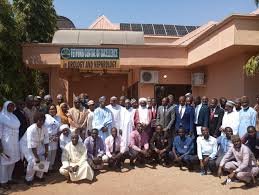The United Nations has issued a warning about the critical state of child malnutrition in northeastern Nigeria, urging immediate action to save millions of lives.
Mohamed Fall, Nigeria’s Resident Coordinator for the United Nations Office for the Coordination of Humanitarian Affairs (UN-OCHA), made this urgent appeal during a visit to a Stabilisation Centre in Yola, Adamawa State, on Monday.
Fall’s visit coincided with the commemoration of World Humanitarian Day 2024, themed #Act for Humanity. The UN official expressed deep concern after witnessing the dire conditions at the center, which treats malnourished children.
“The scenes I saw were heart-wrenching because I saw babies fighting for their lives. It is unconscionable that we should see this level of suffering today,” Fall stated.
According to UN-OCHA projections, 4.8 million people are expected to face food insecurity during the lean season, with 230,000 children at risk of life-threatening severe acute malnutrition. A lean season response plan, which requires $306 million to address the crisis, is currently only 30% funded.
Fall emphasized the need for collective action, calling on partners to address the severe food insecurity and malnutrition affecting Borno, Adamawa, and Yobe states. He urged stakeholders and government agencies to mobilize resources to support humanitarian efforts and help children in need.
Fall said,”We must stand together to act for humanity to make sure that we can put an end to their plight,” highlighting the long-term consequences of malnutrition on children’s physical and intellectual development.
The UN Coordinator expressed concern about families’ ability to bear the cost of treatment and noted the diminishing resources available for humanitarian response compared to the global solidarity seen during the COVID-19 pandemic.
ALSO READ: Fed Gov’t, USAID Launch Nutrition Documents To Tackle Malnutrition In Nigeria
Despite these challenges, Fall expressed optimism about the support from federal and state governments in addressing the situation. He praised the humanitarian efforts in the region, stating, “The humanitarian space is one of the main spaces where humanity has its true expression.”
Sani Mohammed, a medical practitioner at the Stabilisation Centre, revealed that the facility receives an average of 96,000 patients annually from within and outside Adamawa State, underscoring the widespread nature of the malnutrition crisis.


























